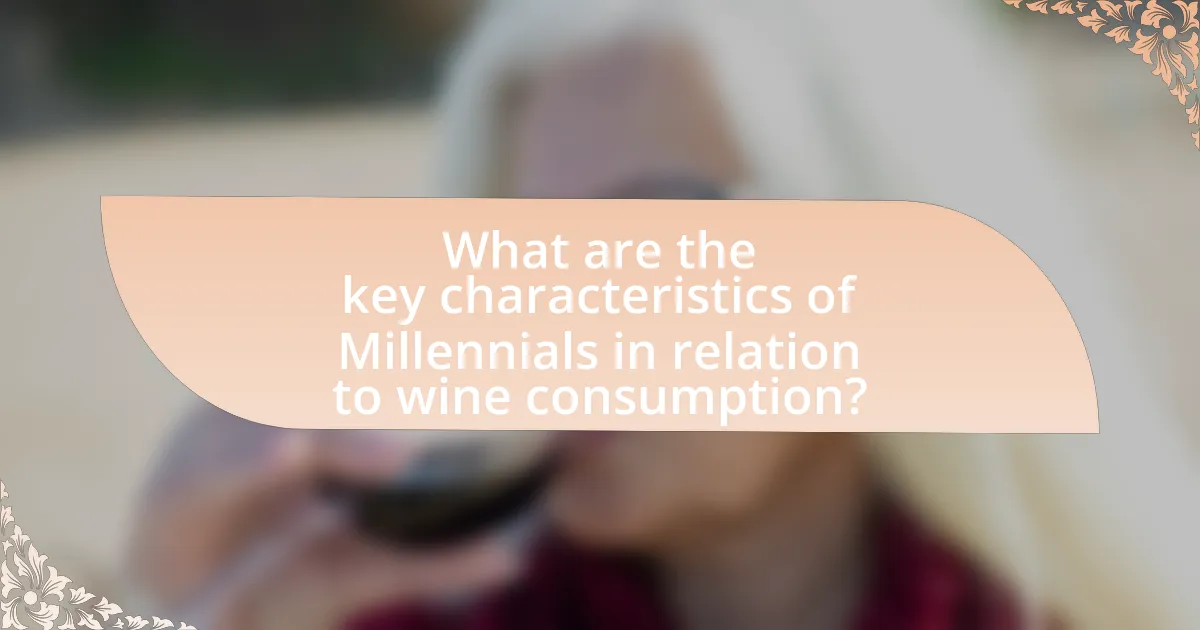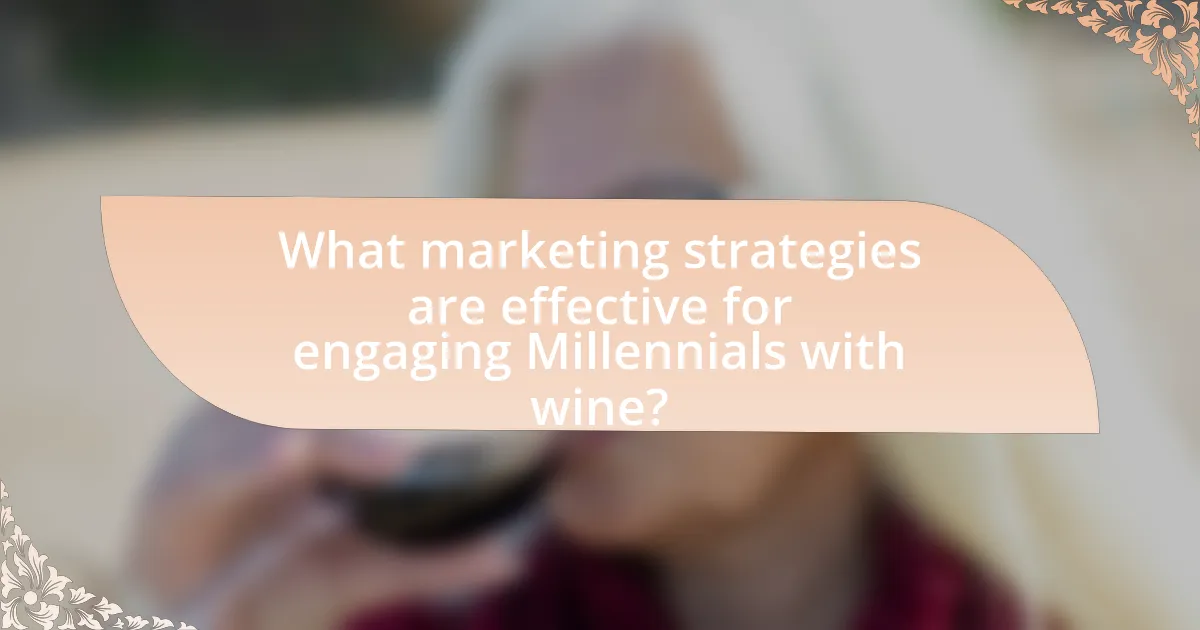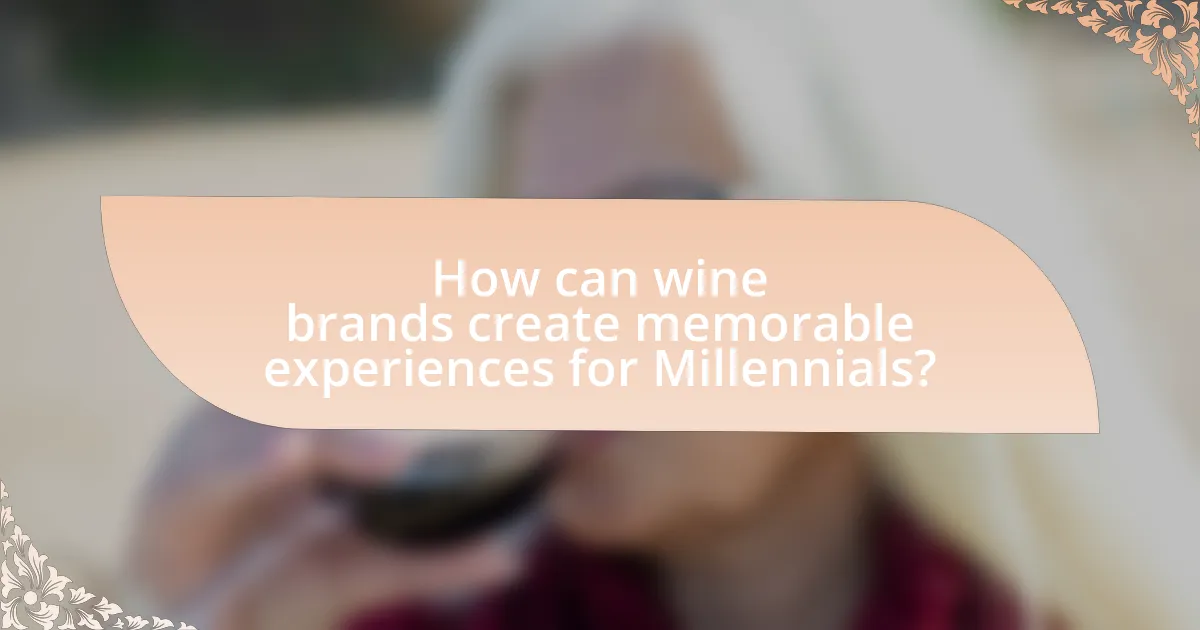The article focuses on effective wine marketing strategies tailored for Millennials, a demographic characterized by their preference for experiences over material goods, authenticity, and sustainability. It explores how Millennials’ wine consumption is influenced by social media, ethical sourcing, and experiential marketing, highlighting their willingness to pay more for sustainable and organic options. Key strategies discussed include leveraging social media platforms, creating memorable experiences through events, and utilizing storytelling to connect with this audience. Additionally, the article emphasizes the importance of transparency and ethical practices in brand messaging to engage Millennial consumers effectively.

What are the key characteristics of Millennials in relation to wine consumption?
Millennials exhibit distinct characteristics in wine consumption, primarily favoring experiences over products, valuing authenticity, and showing a preference for sustainable and organic options. Research indicates that 70% of Millennials prefer to spend money on experiences rather than material goods, which translates into their wine choices, often seeking unique tasting events and vineyard tours. Additionally, they prioritize brands that demonstrate transparency and ethical practices; a survey found that 66% of Millennials are willing to pay more for sustainable products. This generation also tends to favor social media as a primary source for wine recommendations, with platforms like Instagram influencing their purchasing decisions significantly.
How do Millennials’ preferences differ from previous generations?
Millennials prefer experiences over material possessions, which significantly differs from previous generations that often prioritized ownership. This generational shift is evident in their spending habits; for instance, a 2018 study by Eventbrite found that 78% of Millennials would rather spend money on experiences than on physical goods. Additionally, Millennials value authenticity and sustainability in brands, leading them to favor companies that demonstrate social responsibility, unlike earlier generations that focused more on brand loyalty and prestige. This preference for experiential engagement and ethical consumption shapes how marketers approach this demographic, particularly in industries like wine, where storytelling and brand values resonate more than traditional advertising methods.
What factors influence Millennials’ wine choices?
Millennials’ wine choices are influenced by factors such as brand authenticity, social media presence, and sustainability. Research indicates that 66% of Millennials prefer brands that are transparent about their production processes, reflecting a desire for authenticity. Additionally, social media platforms significantly impact their purchasing decisions, with 30% of Millennials stating they are influenced by wine-related content on these platforms. Sustainability also plays a crucial role, as 73% of Millennials are willing to pay more for eco-friendly products, including wine. These factors collectively shape their preferences and purchasing behaviors in the wine market.
How does social media impact Millennials’ wine consumption?
Social media significantly influences Millennials’ wine consumption by shaping their preferences and purchasing behaviors. Platforms like Instagram and Facebook serve as key channels for wine brands to engage with this demographic, showcasing visually appealing content that resonates with their lifestyle. Research indicates that 30% of Millennials are influenced by social media when choosing wine, highlighting the importance of online presence for brands. Additionally, user-generated content and peer recommendations on these platforms enhance trust and drive wine purchases among Millennials, as they often seek validation from their social circles before making decisions.
What role does sustainability play in Millennials’ wine preferences?
Sustainability significantly influences Millennials’ wine preferences, as this generation prioritizes environmentally friendly practices in their purchasing decisions. Research indicates that 73% of Millennials are willing to pay more for sustainable products, including wine, reflecting their commitment to ethical consumption. Additionally, a survey by Wine Intelligence found that 61% of Millennials consider sustainability an important factor when selecting wine brands, often favoring those that employ organic farming, eco-friendly packaging, and social responsibility initiatives. This trend underscores the importance of sustainability in shaping Millennials’ choices in the wine market.
Why is organic and biodynamic wine appealing to this demographic?
Organic and biodynamic wine is appealing to Millennials due to their increasing preference for sustainable and health-conscious products. This demographic values environmentally friendly practices, and organic and biodynamic wines are produced without synthetic pesticides or fertilizers, aligning with their desire for natural and ethical consumption. Additionally, studies show that Millennials are willing to pay a premium for products that reflect their values, with 73% of them indicating that they would support brands committed to sustainability. This trend is further supported by the rise in organic wine sales, which have grown significantly in recent years, indicating a strong market demand among younger consumers.
How do ethical sourcing and production methods affect purchasing decisions?
Ethical sourcing and production methods significantly influence purchasing decisions, particularly among Millennials who prioritize sustainability and social responsibility. Research indicates that 73% of Millennials are willing to pay more for products from companies committed to positive social and environmental impact. This demographic often seeks transparency in sourcing practices, favoring brands that demonstrate ethical labor practices and environmentally friendly production processes. For instance, a study by Nielsen found that 66% of global consumers are willing to pay more for sustainable brands, highlighting the importance of ethical considerations in their purchasing behavior.

What marketing strategies are effective for engaging Millennials with wine?
Effective marketing strategies for engaging Millennials with wine include leveraging social media platforms, creating experiential events, and emphasizing sustainability. Social media, particularly Instagram and TikTok, allows brands to showcase visually appealing content and connect with Millennials through influencers, who significantly impact their purchasing decisions. Experiential events, such as wine tastings and festivals, provide immersive experiences that resonate with this demographic’s preference for unique and memorable activities. Additionally, highlighting sustainable practices in wine production aligns with Millennials’ values, as studies show that 73% of this generation are willing to pay more for sustainable products. These strategies collectively enhance brand loyalty and engagement among Millennial consumers.
How can storytelling enhance wine marketing for Millennials?
Storytelling can enhance wine marketing for Millennials by creating emotional connections that resonate with their values and experiences. This generation seeks authenticity and relatability in brands, and storytelling allows wine marketers to convey the heritage, craftsmanship, and unique narratives behind each bottle. For instance, a study by the Wine Market Council found that Millennials are more likely to purchase wines that have a compelling story, as it adds perceived value and enhances their overall experience. By integrating personal anecdotes, cultural references, and social responsibility themes into their marketing strategies, wine brands can effectively engage Millennials and foster brand loyalty.
What types of narratives resonate most with this audience?
Authentic and relatable narratives resonate most with Millennials in wine marketing. This audience values stories that reflect their experiences, aspirations, and social values, such as sustainability and community. For instance, narratives that highlight organic farming practices or local sourcing connect with their preference for environmentally conscious choices. Research indicates that 73% of Millennials are willing to pay more for sustainable products, demonstrating their alignment with brands that share these values.
How can brands leverage personal experiences in their marketing?
Brands can leverage personal experiences in their marketing by creating authentic narratives that resonate with consumers’ emotions and lifestyles. For instance, brands can share customer testimonials or stories that highlight how their products enhance personal moments, such as celebrations or gatherings. Research indicates that 70% of consumers are more likely to purchase from a brand that demonstrates a genuine connection to its audience through relatable experiences. By integrating user-generated content and personal stories into their campaigns, brands can foster a sense of community and trust, particularly among Millennials, who value authenticity and shared experiences in their purchasing decisions.
What digital marketing tactics are most effective for reaching Millennials?
Social media marketing, particularly on platforms like Instagram and TikTok, is the most effective digital marketing tactic for reaching Millennials. This demographic actively engages with visual content and user-generated posts, making these platforms ideal for brand storytelling and community building. According to a 2021 survey by Statista, 90% of Millennials use social media, with Instagram being a preferred platform for 67% of users in this age group. Additionally, influencer marketing on these platforms has proven to be highly effective, as 49% of Millennials rely on recommendations from influencers when making purchasing decisions.
How can social media campaigns be tailored to attract younger consumers?
Social media campaigns can be tailored to attract younger consumers by leveraging platforms they frequently use, such as Instagram and TikTok, and creating visually appealing, authentic content that resonates with their values. Research indicates that 71% of millennials prefer brands that engage with them on social media, highlighting the importance of interactive and relatable content. Additionally, incorporating user-generated content and influencer partnerships can enhance credibility and foster community, as 79% of millennials report that user-generated content highly impacts their purchasing decisions.
What role do influencers play in wine marketing to Millennials?
Influencers play a crucial role in wine marketing to Millennials by leveraging their social media platforms to create authentic connections and drive brand awareness. Research indicates that 70% of Millennials are influenced by social media when making purchasing decisions, highlighting the effectiveness of influencer marketing in reaching this demographic. Influencers often share personal experiences with wine, provide recommendations, and engage their followers through visually appealing content, which resonates with Millennials’ preferences for authenticity and relatability. This strategy not only enhances brand visibility but also fosters trust, as Millennials are more likely to purchase products endorsed by individuals they admire.

How can wine brands create memorable experiences for Millennials?
Wine brands can create memorable experiences for Millennials by leveraging immersive events and personalized marketing strategies. Engaging Millennials through interactive wine tastings, vineyard tours, and social media campaigns fosters a deeper connection with the brand. For instance, a study by Wine Intelligence found that 70% of Millennials prefer experiences over material goods, indicating that experiential marketing resonates strongly with this demographic. Additionally, incorporating technology, such as augmented reality labels or mobile apps that enhance the tasting experience, can further captivate this audience. By focusing on authenticity and storytelling, wine brands can effectively engage Millennials and create lasting impressions.
What types of events appeal to Millennial wine drinkers?
Millennial wine drinkers are particularly attracted to experiential events such as wine tastings, vineyard tours, and food and wine pairing dinners. These events provide opportunities for social interaction, education about wine, and unique experiences that resonate with their desire for authenticity and engagement. According to a study by the Wine Market Council, 70% of Millennials prefer experiences over material goods, highlighting the importance of event-based marketing strategies that focus on creating memorable moments rather than just selling products.
How can wine tastings be designed to engage this demographic?
Wine tastings can be designed to engage Millennials by incorporating interactive experiences and social elements. This demographic values unique, memorable experiences over traditional wine tasting formats. For instance, offering themed tastings that align with popular culture or current trends can attract their interest. Additionally, integrating technology, such as mobile apps for tasting notes or augmented reality features, enhances engagement. Research indicates that 70% of Millennials prefer experiences over material goods, highlighting the importance of creating an engaging atmosphere. Furthermore, providing opportunities for social sharing, such as photo-friendly setups or collaborative tasting sessions, can increase participation and enjoyment among this age group.
What unique experiences can brands offer to stand out?
Brands can offer immersive tasting events that combine education and entertainment to stand out. For example, hosting vineyard tours that include interactive wine-making workshops allows consumers to engage directly with the product and its origins. This approach not only enhances brand loyalty but also aligns with Millennials’ preference for experiential consumption, as evidenced by a study from Eventbrite which found that 78% of Millennials prefer to spend money on experiences rather than material goods. By creating memorable and participatory experiences, brands can effectively differentiate themselves in a competitive market.
How can wine brands utilize technology to connect with Millennials?
Wine brands can utilize technology to connect with Millennials by leveraging social media platforms and mobile applications for targeted marketing and engagement. Social media allows brands to create visually appealing content that resonates with Millennials, who prioritize experiences and aesthetics; for instance, Instagram is a powerful tool for showcasing wine culture through engaging imagery and storytelling. Additionally, mobile applications can facilitate personalized recommendations and loyalty programs, enhancing the consumer experience. According to a study by Nielsen, 66% of Millennials are influenced by social media when making purchasing decisions, highlighting the effectiveness of these technological strategies in reaching this demographic.
What apps or platforms are popular among Millennial wine consumers?
Popular apps and platforms among Millennial wine consumers include Vivino, Wine.com, and Instagram. Vivino allows users to scan wine labels, read reviews, and track their wine preferences, making it a favored choice for Millennials seeking personalized wine experiences. Wine.com offers a vast selection of wines and user-friendly features for purchasing, which appeals to the convenience-driven Millennial demographic. Additionally, Instagram serves as a visual platform where Millennials discover wine brands, share experiences, and engage with wine-related content, significantly influencing their purchasing decisions. These platforms collectively cater to the preferences and behaviors of Millennial wine consumers, enhancing their engagement with wine culture.
How can augmented reality enhance the wine purchasing experience?
Augmented reality can enhance the wine purchasing experience by providing interactive and immersive information about wines, allowing consumers to visualize labels, tasting notes, and food pairings in real-time. This technology enables customers to scan wine bottles with their smartphones, revealing detailed information such as vineyard history, production methods, and user reviews, which can influence purchasing decisions. A study by the International Journal of Wine Business Research found that 70% of consumers reported a more engaging shopping experience when using augmented reality applications, demonstrating its effectiveness in attracting and retaining millennial customers.
What are the best practices for wine marketing aimed at Millennials?
The best practices for wine marketing aimed at Millennials include leveraging social media, emphasizing sustainability, and creating experiential marketing opportunities. Social media platforms like Instagram and TikTok are crucial for reaching Millennials, as 71% of this demographic uses these platforms to discover new products. Highlighting sustainable practices resonates with their values; studies show that 73% of Millennials are willing to pay more for sustainable products. Additionally, experiential marketing, such as wine tastings and vineyard tours, fosters engagement and creates memorable experiences, which are essential for building brand loyalty among this generation.
How can brands effectively measure the success of their marketing strategies?
Brands can effectively measure the success of their marketing strategies by utilizing key performance indicators (KPIs) such as sales growth, customer engagement metrics, and return on investment (ROI). For instance, tracking sales growth allows brands to assess the direct impact of marketing campaigns on revenue, while customer engagement metrics, such as social media interactions and website traffic, provide insights into audience interest and brand perception. Additionally, calculating ROI helps brands determine the financial effectiveness of their marketing expenditures. According to a study by HubSpot, companies that actively measure their marketing performance are 1.5 times more likely to see a positive return on their marketing investments, highlighting the importance of these measurement strategies.
What common pitfalls should be avoided in targeting Millennial consumers?
Common pitfalls to avoid in targeting Millennial consumers include failing to understand their values and preferences, which can lead to ineffective marketing strategies. Millennials prioritize authenticity, social responsibility, and experiences over material goods; thus, brands that do not align with these values risk alienating this demographic. For instance, a study by Nielsen found that 73% of Millennials are willing to pay more for sustainable products, highlighting the importance of incorporating ethical practices into marketing efforts. Additionally, using outdated marketing channels, such as traditional television ads, can result in low engagement, as Millennials predominantly consume content through digital platforms. Brands must also avoid being overly promotional or insincere, as Millennials are adept at recognizing inauthentic messaging, which can damage brand trust.